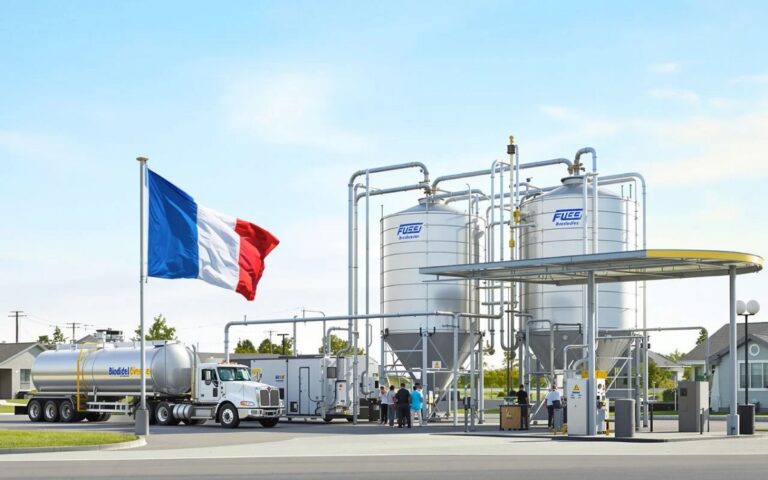A groundbreaking innovation from UC Santa Cruz has made it possible to convert used cooking oils into biodiesel in under an hour. This new method promises to transform how we approach sustainable energy, offering a significant opportunity for France.
A Revolutionary Breakthrough in Biodiesel Production
Scientists have discovered a groundbreaking method to transform used cooking oils into biodiesel in under an hour. Developed by researchers at UC Santa Cruz, this innovative process is not only faster but also more energy-efficient than traditional methods. By using a unique chemical reagent, the technique promises to revolutionize how industries approach sustainable fuel production, offering a viable alternative to conventional diesel.
How the Process Works
The key to this innovation lies in the use of sodium tetramethoxyborate (NaB(OMe)4), a reagent that reacts efficiently with used oils to produce biodiesel. Unlike traditional methods that involve complex and energy-intensive steps, this process requires minimal effort. The reaction takes place at just 40°C (104°F)—far below boiling point—and completes in less than 60 minutes. The simplicity extends to the byproducts, which can be separated through basic decantation, making the process both economical and practical.
Why This Process Matters
As residential sectors shift towards solar and electric energy, heavy industries remain reliant on diesel-powered vehicles like trucks, trains, and ships. These industries, which are critical for global logistics, are unlikely to electrify anytime soon. This new biodiesel production method offers a practical and sustainable solution for reducing reliance on fossil fuels in sectors that need diesel most.
France’s Biodiesel Potential: 136,000 Tons of Fuel
France alone stands to benefit significantly from this innovation. With an annual consumption of 170,000 tons of cooking oil, the country could potentially recover up to 136,000 tons of biodiesel using this process. This represents a major opportunity for the nation to reduce its dependence on imported fossil fuels while simultaneously tackling food waste. By integrating this process into its energy mix, France could take a decisive step toward achieving its environmental goals and fostering energy self-sufficiency.
The Benefits of Carbon-Neutral Fuel
The biodiesel produced through this process is carbon-neutral and compatible with existing diesel engines, meaning no costly modifications are required. This makes it an attractive option for both individuals and industries aiming to reduce their carbon footprint. Moreover, the ability to regenerate the most expensive reagent used in production further enhances the economic feasibility of this method.
Applications Beyond Large-Scale Production
This method isn’t limited to large refineries. According to Scott Oliver, co-author of the study and professor of chemistry, it’s versatile enough to be used in smaller, localized settings. “This could have a significant impact on how we produce and consume energy,” he noted. Farmers, for instance, could potentially set up small-scale biodiesel production facilities on-site, eliminating the need for centralized refineries.
Avoiding the Pitfalls of Current Methods
Traditional biodiesel production often involves the use of hydroxide-based processes, which can lead to complications like soap formation and water contamination. This new approach sidesteps these issues entirely, yielding a clean, high-quality biodiesel. Additionally, the byproducts—solid glycerol-boron compounds—are easy to isolate, streamlining the entire process.
A Step Toward a Sustainable Future
This method has already proven successful with various types of waste oils, including used cooking oils from fast-food chains and animal fats. With an average yield of 85% and a rapid production time, it paves the way for wider adoption of biodiesel as a sustainable fuel option. By embracing this innovation, industries and governments can take a significant step toward reducing greenhouse gas emissions and promoting a greener future.
A Game-Changer for France’s Energy Landscape
The potential impact of this breakthrough extends beyond environmental benefits. By capitalizing on this process, France could save billions in fuel imports while fostering a circular economy. Transforming waste into valuable fuel aligns perfectly with the nation’s push for sustainability and energy independence. This innovation marks a turning point for both the biodiesel industry and the broader push for renewable energy solutions, ensuring a cleaner, more sustainable world for future generations.






